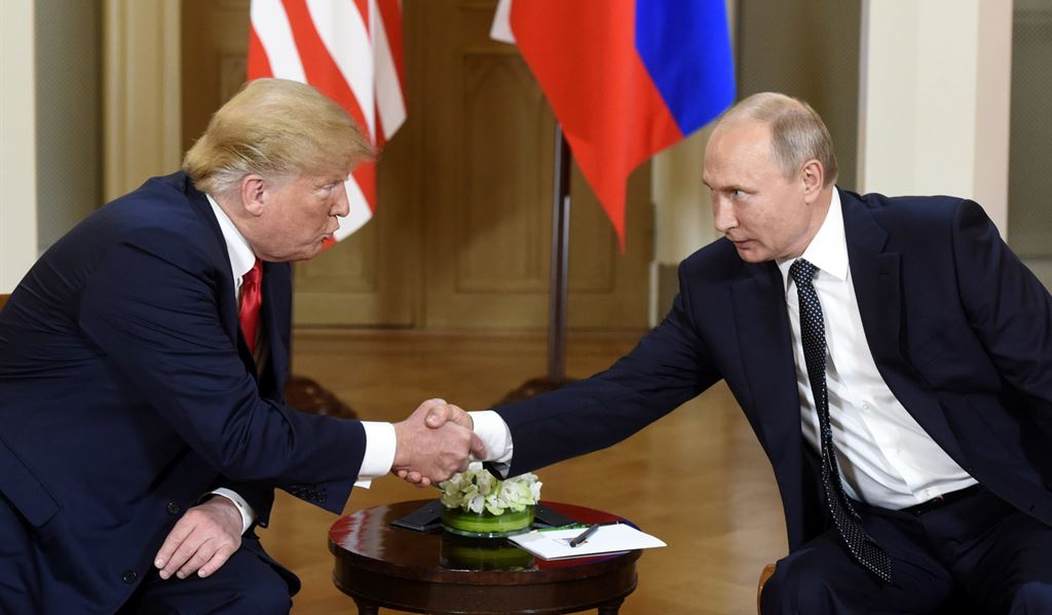The political train wreck came Monday in Helsinki, Finland, at the joint news conference between U.S. President Donald Trump and Russian President Vladimir Putin. The final question came from Jonathan Lemire, of Associated Press, and Trump's answer resulted in bipartisan uproar.
Lemire asked Trump if he believed Putin's denial that he had been involved in "the election interference in 2016."
Trump responded by backtracking into the process of the investigation. "Why was the FBI told to leave the office of the Democratic National Committee [without taking the server]? ...I want to know, where is the server?"
Trump then moved on, citing his director of national intelligence. "My people came to me -- Dan Coats came to me and some others -- they said they think it's Russia. I have President Putin; he just said it's not Russia."
Trump continued, "I will say this: I don't see any reason why it would be. He finished, noting, "but I really do want to see the server."
Without being asked to do so, Putin then gave his opinion: "The final conclusion in this kind of dispute can only be delivered by a trial by the court, not by the executive -- by the law enforcement."
Putin offered to provide access to the Russian intelligence officers if "we can extend this cooperation, but we should do it on a reciprocal basis." Interpret that to mean: "I'll let you talk to mine if I can talk to yours." Fat chance.
Interestingly, a split between Putin and Trump was on clear display regarding Crimea. "The posture of President Trump on Crimea is well-known," Putin answered, "and he stands firmly by it. He continued to maintain that it was illegal to annex it. We -- our viewpoint is different."
Everyone went crazy over Trump's statement on election interference, which he corrected the next day.
Recommended
"So, I'll begin by stating that I have full faith and support for America's great intelligence agencies; always have," Trump said ."And I have felt very strongly that, while Russia's actions had no impact at all on the outcome of the election, let me be totally clear in saying that -- and I've said this many times -- I accept our intelligence community's conclusion that Russia's meddling in the 2016 election took place. Could be other people also; there's a lot of people out there.
"In a key sentence in my remarks, I said the word 'would' instead of 'wouldn't.'" The sentence should have been: 'I don't see any reason why I wouldn't -- or why it wouldn't be Russia.' ...So I just wanted to clear up; I have the strongest respect for our intelligence agencies headed by my people. We have great people, whether it's [CIA Chief] Gina [Haspel] or Dan Coats, or any of them."
This is Trump's fastest correction to date and an indication that he is learning rapidly.
Meanwhile, in the rest of the United States, where people get up everyday, go to work, to school, pay bills, go grocery shopping, wash clothes and make mistakes, this may be remembered as the one time Trump rapidly corrected himself.
On Tuesday, the Public Religion Research Institute released , a voter engagement survey conducted with The Atlantic. (1,031 people, June 6 - 18, +/- 3.3 points).
Emma Green reported the results in "One Country, Two Radically Different Narratives," in The Atlantic. "Newspapers have been pounding out stories about possible collusion between the Trump administration and foreign governments before the 2016 election," wrote Green. "The New York Times editorial board has called reported Russian attempts to interfere in American elections 'a profound national security threat.' And yet, only 45 percent of survey respondents said outside influence from foreign governments is a major problem in American elections, along starkly partisan lines: 68 percent of Democrats versus only 22 percent of Republicans, and 40 percent of independents."
Green concluded, "The bigger implication is that elites, whether they're politicians or pundits, have miscalculated what's important to regular voters. Or, to think of it another way, perhaps they haven't successfully persuaded people to care about issues such as the alleged Russia scandal... Breaking stories in Washington may not match the stories people truly care about."
Maybe another implication is that the elites, whether they're politicians or pundits, should pay more attention to what everyday Americans are most concerned about.

























Join the conversation as a VIP Member